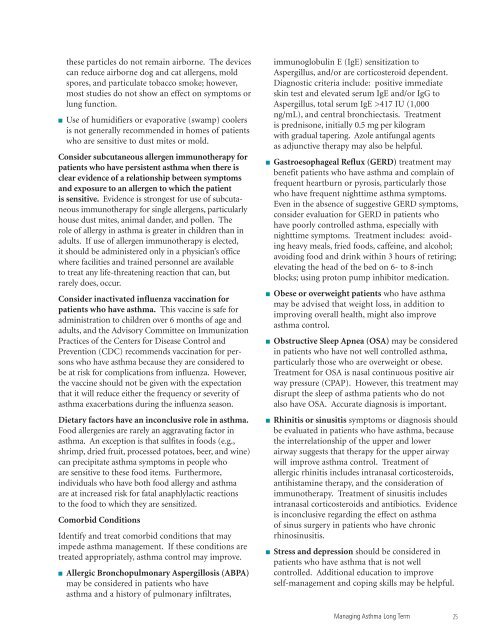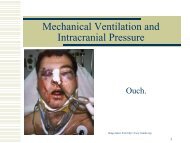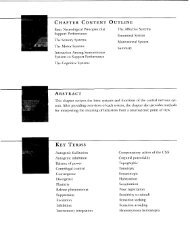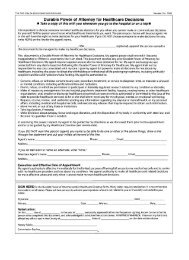Guidelines for the Diagnosis and Management of Asthma
Guidelines for the Diagnosis and Management of Asthma
Guidelines for the Diagnosis and Management of Asthma
Create successful ePaper yourself
Turn your PDF publications into a flip-book with our unique Google optimized e-Paper software.
<strong>the</strong>se particles do not remain airborne. The devices<br />
can reduce airborne dog <strong>and</strong> cat allergens, mold<br />
spores, <strong>and</strong> particulate tobacco smoke; however,<br />
most studies do not show an effect on symptoms or<br />
lung function.<br />
■ Use <strong>of</strong> humidifiers or evaporative (swamp) coolers<br />
is not generally recommended in homes <strong>of</strong> patients<br />
who are sensitive to dust mites or mold.<br />
Consider subcutaneous allergen immuno<strong>the</strong>rapy <strong>for</strong><br />
patients who have persistent asthma when <strong>the</strong>re is<br />
clear evidence <strong>of</strong> a relationship between symptoms<br />
<strong>and</strong> exposure to an allergen to which <strong>the</strong> patient<br />
is sensitive. Evidence is strongest <strong>for</strong> use <strong>of</strong> subcutaneous<br />
immuno<strong>the</strong>rapy <strong>for</strong> single allergens, particularly<br />
house dust mites, animal d<strong>and</strong>er, <strong>and</strong> pollen. The<br />
role <strong>of</strong> allergy in asthma is greater in children than in<br />
adults. If use <strong>of</strong> allergen immuno<strong>the</strong>rapy is elected,<br />
it should be administered only in a physician’s <strong>of</strong>fice<br />
where facilities <strong>and</strong> trained personnel are available<br />
to treat any life-threatening reaction that can, but<br />
rarely does, occur.<br />
Consider inactivated influenza vaccination <strong>for</strong><br />
patients who have asthma. This vaccine is safe <strong>for</strong><br />
administration to children over 6 months <strong>of</strong> age <strong>and</strong><br />
adults, <strong>and</strong> <strong>the</strong> Advisory Committee on Immunization<br />
Practices <strong>of</strong> <strong>the</strong> Centers <strong>for</strong> Disease Control <strong>and</strong><br />
Prevention (CDC) recommends vaccination <strong>for</strong> persons<br />
who have asthma because <strong>the</strong>y are considered to<br />
be at risk <strong>for</strong> complications from influenza. However,<br />
<strong>the</strong> vaccine should not be given with <strong>the</strong> expectation<br />
that it will reduce ei<strong>the</strong>r <strong>the</strong> frequency or severity <strong>of</strong><br />
asthma exacerbations during <strong>the</strong> influenza season.<br />
Dietary factors have an inconclusive role in asthma.<br />
Food allergenies are rarely an aggravating factor in<br />
asthma. An exception is that sulfites in foods (e.g.,<br />
shrimp, dried fruit, processed potatoes, beer, <strong>and</strong> wine)<br />
can precipitate asthma symptoms in people who<br />
are sensitive to <strong>the</strong>se food items. Fur<strong>the</strong>rmore,<br />
individuals who have both food allergy <strong>and</strong> asthma<br />
are at increased risk <strong>for</strong> fatal anaphlylactic reactions<br />
to <strong>the</strong> food to which <strong>the</strong>y are sensitized.<br />
Comorbid Conditions<br />
Identify <strong>and</strong> treat comorbid conditions that may<br />
impede asthma management. If <strong>the</strong>se conditions are<br />
treated appropriately, asthma control may improve.<br />
■ Allergic Bronchopulmonary Aspergillosis (ABPA)<br />
may be considered in patients who have<br />
asthma <strong>and</strong> a history <strong>of</strong> pulmonary infiltrates,<br />
immunoglobulin E (IgE) sensitization to<br />
Aspergillus, <strong>and</strong>/or are corticosteroid dependent.<br />
Diagnostic criteria include: positive immediate<br />
skin test <strong>and</strong> elevated serum IgE <strong>and</strong>/or IgG to<br />
Aspergillus, total serum IgE >417 IU (1,000<br />
ng/mL), <strong>and</strong> central bronchiectasis. Treatment<br />
is prednisone, initially 0.5 mg per kilogram<br />
with gradual tapering. Azole antifungal agents<br />
as adjunctive <strong>the</strong>rapy may also be helpful.<br />
■ Gastroesophageal Reflux (GERD) treatment may<br />
benefit patients who have asthma <strong>and</strong> complain <strong>of</strong><br />
frequent heartburn or pyrosis, particularly those<br />
who have frequent nighttime asthma symptoms.<br />
Even in <strong>the</strong> absence <strong>of</strong> suggestive GERD symptoms,<br />
consider evaluation <strong>for</strong> GERD in patients who<br />
have poorly controlled asthma, especially with<br />
nighttime symptoms. Treatment includes: avoiding<br />
heavy meals, fried foods, caffeine, <strong>and</strong> alcohol;<br />
avoiding food <strong>and</strong> drink within 3 hours <strong>of</strong> retiring;<br />
elevating <strong>the</strong> head <strong>of</strong> <strong>the</strong> bed on 6- to 8-inch<br />
blocks; using proton pump inhibitor medication.<br />
■ Obese or overweight patients who have asthma<br />
may be advised that weight loss, in addition to<br />
improving overall health, might also improve<br />
asthma control.<br />
■ Obstructive Sleep Apnea (OSA) may be considered<br />
in patients who have not well controlled asthma,<br />
particularly those who are overweight or obese.<br />
Treatment <strong>for</strong> OSA is nasal continuous positive air<br />
way pressure (CPAP). However, this treatment may<br />
disrupt <strong>the</strong> sleep <strong>of</strong> asthma patients who do not<br />
also have OSA. Accurate diagnosis is important.<br />
■ Rhinitis or sinusitis symptoms or diagnosis should<br />
be evaluated in patients who have asthma, because<br />
<strong>the</strong> interrelationship <strong>of</strong> <strong>the</strong> upper <strong>and</strong> lower<br />
airway suggests that <strong>the</strong>rapy <strong>for</strong> <strong>the</strong> upper airway<br />
will improve asthma control. Treatment <strong>of</strong><br />
allergic rhinitis includes intranasal corticosteroids,<br />
antihistamine <strong>the</strong>rapy, <strong>and</strong> <strong>the</strong> consideration <strong>of</strong><br />
immuno<strong>the</strong>rapy. Treatment <strong>of</strong> sinusitis includes<br />
intranasal corticosteroids <strong>and</strong> antibiotics. Evidence<br />
is inconclusive regarding <strong>the</strong> effect on asthma<br />
<strong>of</strong> sinus surgery in patients who have chronic<br />
rhinosinusitis.<br />
■ Stress <strong>and</strong> depression should be considered in<br />
patients who have asthma that is not well<br />
controlled. Additional education to improve<br />
self-management <strong>and</strong> coping skills may be helpful.<br />
Managing <strong>Asthma</strong> Long Term<br />
25





